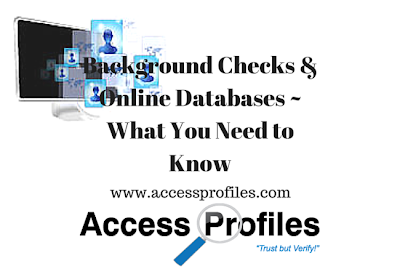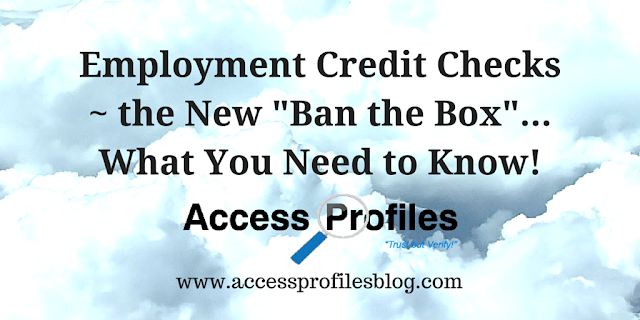 |
| What is Missing in Your #OnlineDatabaseSearch |
You see them everywhere. Ads touting “totally free”, “instant”, or "low cost" background checks. They all promise to get you information on anyone at any time.
Just do an online search for “Background Checks” and you will see what I mean. Over 40 million results pop up from “$9.83 for Unlimited Searches”, “Background Checks - Search for Free!”, to my personal favorite, “Instant Background Checks - 100% Free”!
Who wouldn’t be intrigued?
And if you are a small business working within a budget and pressed for time, then you might possibly be tempted to give it a try.
But take my advice, and Stop Right There!
Your Online Database Search is Missing Something Essential ~ the Second Step! "Tweet This"
And that second step is where a real, quality Background Check shines.
That Second Step is additional verification, and it is the key to ensuring you get accurate and up-to-date information on the subject of your search.
Checking any information found through a database search against real court records is crucial. It is truly the single best way to determine whether any criminal record found actually belongs to your subject.
It will also help you determine whether the record is complete. A good record should contain details of the charges, final disposition, and sentence. If no disposition is listed, then you will be able to determine if it is an active case where no disposition is yet recorded.
Databases may also not contain all the information you need. There are counties that either do not report their case information in a timely manner or not at all. That can result in major holes in your report.
 |
| #BackgroundChecks vs #OnlineDatabases |
I have written about the potential for errors in my previous article on the limitations of online databases. Find out more here.
In addition, many online sites have fine print in their “terms of use” that states that they are not a Consumer Reporting Agency (CRA) and their information is not to be used for employment purposes.
And while a database search may still seem like a cheap and quick way to go, relying solely on that information to make your hiring decisions can get you and your company into hot water.
There is the real potential of running afoul of the EEOC and possibly violating state and federal employment screening laws when using an online database.
Is there any doubt then that that 2nd Step is critical?
And while it is possible for you to try and go through the courts yourself for that 2nd Step, your best option is to find a good Background Check company that can help.
They will already know the ins and outs of the court system and can more easily get you the information you need. They will also be completely up to date on all compliance issues and make sure your company is hiring both safely and effectively.
To find the best Background Check company for you and your Small Business, using these 5 Tips will help.
 |
| Choosing a Good #BackgroundCheck Company |
There is definitely a difference between an Online Database search and the kind of information a Real Background Background check will provide. Taking that extra step is the only way you can verify whether the information you have is complete.
And if you are using those results to hire someone for your Small Business, then it is more critical than ever that you know you are basing that decision on the best information possible.
Both You and Your Applicants deserve nothing less!
Please Pass it On and share this article! Thanks!
Authored by

Be sure to subscribe to this blog on my website and you will get one new article each week focused on tips and information to help you and your Small Business!
Let’s Connect on Facebook, LinkedIn, Twitter, and Google+ too!







